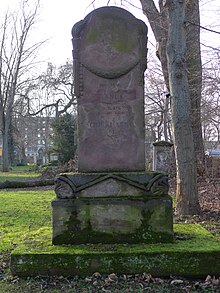Gottlieb Jakob Planck
Gottlieb Jakob Planck (born November 15, 1751 in Nürtingen , † August 31, 1833 in Göttingen ) was a German Protestant theologian and church historian .
Life

Planck was the oldest of 16 siblings and attended the Nürtingen Latin School. After that he was a monastery student in Bebenhausen and Blaubeuren from 1763 to 1765 and then studied theology in Tübingen with a ducal scholarship until 1774. From 1775 to 1780 Planck worked as a repeater at the Tübingen monastery . In 1781 he married Luise Schickhardt, a daughter of the ducal financier Andreas Schickhardt , and moved to Stuttgart . From 1781 to 1784 he was a preacher and associate professor at the high Charles School in Stuttgart. In 1784 he received - also through the mediation of his friend Ludwig Timotheus Spittler - the call to the professorship for church history at the University of Göttingen , which he held until his death. In 1815 he was rector of the University of Göttingen. A plaque commemorates him on his home at Johannisstrasse 29.
In addition to the professorship, Planck also held church offices. In 1791 he was appointed to the consistorial council, from 1805 to 1827 he was general superintendent of the general diocese of Göttingen . From 1828 until his death in 1833 Planck was abbot of the Bursfelde monastery near Hann. Münden in the Weser Uplands .
He was the great-grandfather of the physicist Nobel Prize winner Max Planck .
power
Planck's most important work, the history of the origin, the changes and the formation of the Protestant concept of teaching , appeared in six volumes from 1781 to 1800. This was followed by a number of other monographs on the history of the church ( outline of a history of the church constitution, church government and canon law, especially with regard to the German church . Göttingen 1790; Anecdota ad historiam Concilii Tridentini pertinentia, fasc.I – XXV . Göttingen 1791–1818 ; About the time of the first origin of the diocesan constitution and diocesan relations in the church . Göttingen 1792; Outline of a historical and comparative presentation of the dogmatic systems of our various main Christian parties according to their basic concepts, their derived differentiation doctrines and their practical consequences . Göttingen 1796; Geschichte der christlich -church social constitution . 5 volumes Hanover 1803-1809) of partly large size. He was particularly interested in the initiation of a union between Reformed and Lutherans ( On the separation and reunification of the main Christian parties, with a brief historical account of the circumstances that led to the separation of the Lutheran and Reformed parties, and the attempts that were made to reunite them were . Tübingen 1803); but also a unity of the Protestant and the Roman Catholic Church was possible ( Words of peace to the Catholic Church against its union with the Protestant . Göttingen 1809; About the current situation and conditions of the Catholic and Protestant parties in Germany and some special provisions to be expected in part from the German Bundestag . Hanover 1816). As a representative of rationalistic supranaturalism , he also advocated the authenticity and historical reliability of the Gospels ( On the treatment, durability and value of historical evidence for the divinity of Christianity . Göttingen 1821).

Known students
- Ernst Sartorius (1797-1859)
Individual evidence
literature
- Friedrich Lücke : Dr. Gottlieb Jacob Planck. A biographical attempt . Vandenhoeck and Ruprecht, Göttingen 1835 ( digitized version ).
- Christoph Nooke: Gottlieb Jakob Planck (1751-1833). Basic questions of Protestant theology around 1800 . Mohr Siebeck, Tübingen 2014, ISBN 978-3-16-152266-6 .
- Jonas Schmidt: Planck, Gottlieb Jacob. In: Biographisch-Bibliographisches Kirchenlexikon (BBKL). Volume 7, Bautz, Herzberg 1994, ISBN 3-88309-048-4 , Sp. 705-710.
- Julius August Wagenmann : Planck, Gottlieb Jakob . In: Allgemeine Deutsche Biographie (ADB). Volume 26, Duncker & Humblot, Leipzig 1888, pp. 224-227.
Web links
- Literature by and about Gottlieb Jakob Planck in the catalog of the German National Library
- Works by and about Gottlieb Jakob Planck in the German Digital Library
| personal data | |
|---|---|
| SURNAME | Planck, Gottlieb Jakob |
| ALTERNATIVE NAMES | Plank, Gottlieb Jakob |
| BRIEF DESCRIPTION | German Protestant theologian and church historian |
| DATE OF BIRTH | November 15, 1751 |
| PLACE OF BIRTH | Nürtingen |
| DATE OF DEATH | August 31, 1833 |
| Place of death | Goettingen |
